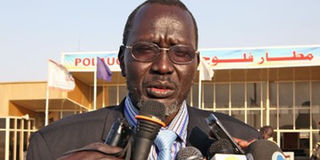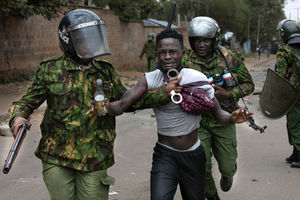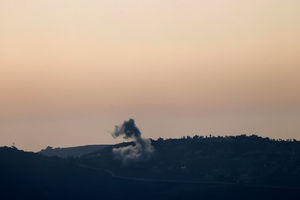South Sudan govt sets new financial policies

South Sudan finance minister Stephen Dhieu Dau
What you need to know:
- Minister of Finance and Economic Planning Stephen Dheiu Dau said the regulations are intended to combat money laundering, inflation, repatriation of foreign currency and tax evasion or disguise of funds obtained from illegal sources.
- Under the new guidelines, all financial institutions and individuals will be required to report any transaction such as withdrawals, deposits and bank transfers above 10,000 dollars to the central bank for approval.
Juba. South Sudan has set new policies requiring banks and individuals seeking to transact amounts above 10,000 U.S. dollars to undergo checks and approval procedures from the country’s central bank.
Minister of Finance and Economic Planning Stephen Dheiu Dau said the regulations are intended to combat money laundering, inflation, repatriation of foreign currency and tax evasion or disguise of funds obtained from illegal sources.
Under the new guidelines, all financial institutions and individuals will be required to report any transaction such as withdrawals, deposits and bank transfers above 10,000 dollars to the central bank for approval.
“It is only in South Sudan that people like to keep large quantity of cash in their houses.
This can be a threat to our national security, because it can be used to finance terrorists and encourage the black market,” Dau said.
“We have agreed with the new leadership of the Central Bank to harmonize issues of large cash transactions,” he added.
He warned that any financial institution that violates the provisions shall be subjected to penalties under the country’s Anti-money Laundering and Counter Terrorism Financing laws.
“After the deadline, anybody who wants to withdraw or deposit money more than 10,000 dollars will be questioned and we will use our available monetary policies to investigate the source of that money,” Dau said.
South Sudan depends on oil revenue for 98 percent of its budget, but production reduced significantly due to the 2013 civil war, causing most oilfields in the country’s northern Upper Nile region to shut down as production fell to below 130,000 barrels per day (bpd) from 350,000 bpd.
The east African nation is currently struggling with hyper inflation amid shortage of foreign reserves to support imports. (NMG)




